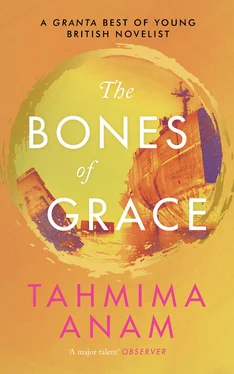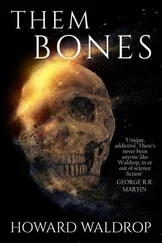‘Come home, sweetheart, we’ll talk.’
‘Did you know about my sister?’
I heard him take a deep breath. ‘A sister? What do you mean?’
‘Dolly said there were two of us. Twins.’
A pause. Maybe he was wondering if I’d gone mad, whether I was making the whole thing up, but he didn’t let on if he did. ‘I didn’t know, sweetheart — your mother and I — we would have never kept something like that from you.’
‘I want to say sorry to Ammoo.’
‘Please don’t cry. Take the first flight, I’ll pick you up at the airport.’
‘I don’t know. Let me think about it.’
Rashid extinguished his cigarette and went into the bathroom to brush his teeth. I suddenly felt the need to be anywhere but in that room, in that moment, with the rain outside and the smoke inside and Rashid with his face puffed up with forgiveness. I looked out the window, and I was angry now that I couldn’t just go outside and take a bus or walk on the pavement, because I didn’t come from the sort of place where someone like me could open the gate and let the dust of the road onto my shoes. I wanted to be somewhere else, not just away from this house, but from this country. What if I had been adopted from some other country? China, perhaps. Or Vietnam. Anywhere was better than here. I lay back on the bed and closed my eyes, trying to imagine the next few days, the silence around the table, the words ‘bad background’ echoing in my ears, and later, if we patched things up, living with Dolly and Bulbul and hoping she wouldn’t run into me on the stairs, wondering idly if Rashid had ever considered building a separate entrance for us, or if we might, at some point, move into our own place, or if he just assumed I would live with his parents for ever, eating Friday breakfasts around the big table, entertaining guests in a living room with four sofas.
Finally I fell asleep, only to wake a few minutes later with an image of my twin, a beggar on the street, her palm out, her lips drawn tight around a mouth that had never known anything of pleasure, not a kiss, or a teaspoon of sugar. I told myself I was assuming things, that perhaps she had enjoyed a perfectly all right life — maybe not a life of privilege, but a comfortable enough life. Maybe she had a home. A pond. Laying hens. A vegetable patch. Maybe it wasn’t so bad. She would have at least known her own mother, which is what I, with all the money in the world, had never had. This is what kept me awake, long into the night, as thunder pounded the sky overhead.
In the morning I packed my bag and went downstairs to see if Joshim would drive me to the beach. It was pouring as I stepped out onto the terrace, and I watched for a few moments as the lime tree and the bougainvillaea danced with the weight of the rain. When I turned back, my hair plastered against my forehead, I found Bulbul lying back on an old rattan armchair in the living room.
‘Come here,’ he said, waving his hand.
He was holding a small tumbler of whisky. I sat down on a chair as far from him as possible without seeming impolite. He pointed his drink at me and held my gaze for a few moments. Then he said, ‘Your mother was a shit-poor woman from nowhere. And now you are the daughter-in-law of this house.’
I smiled, delighted by his rudeness. ‘Lucky me.’
‘We were worried you would turn out ugly. Or a darkie. Who knows who your father was — he could have looked like anything.’
I had burned my bridges with Dolly and there seemed little left to lose. And he would probably not remember any of this tomorrow. ‘I hate you,’ I said.
‘But when the girl brought you to us, we all fell in love with you. Me, Dolly, your parents. Sweetest baby anyone had ever seen. How does a woman like that have a baby like this? It’s one of God’s mysteries. And two of you.’
There it was again. My sister. ‘Did you see her?’
Bulbul put his drink on the flat wooden armrest of his chair. ‘We did. Spitting image.’
‘And what did you do? I asked, my voice shaking, ‘Choose one?’
‘Something like that.’
Again I questioned my own ignorance. I knew all the clichés about twins, how they sensed one another’s presence, how if one was injured, the other would feel pain. I had never felt anyone’s pain but my own — did this mean my sister had lived a life as untrammelled as mine? I knew this could not be. There had been pains and wounds and injuries: I had just been ignorant of them. And what about my mother — what did my mother do? Try and love one child as if she was loving us both? Put one mouth to her breast and imagine the other mouth on the other breast? Take some comfort in knowing that one would never go hungry, while the other would know her love?
‘Did I have a name?’ I asked. ‘Did she?’
He slid further down the chair. I could see the roof of his mouth when he spoke. ‘Your name was Mohona,’ he said. ‘And her name was Megna.’
Megna and Mohona. Mohona — Megna. Mo and Meg. Megna.
‘Megna what?’
‘Oh, people like that don’t have surnames. Of course your mother wanted to choose a new name for you, so then you became Zubaida. Our little Zubaida.’
Mohona. Megna. Where had I heard that name before? I couldn’t remember. Megna — Mohona. Then I did. Shouted across a street by a stranger. Could it be? No. It was a common enough name. A common mistake. But he had been so sure. He had looked at me and seen someone else. I tried to remember his face, but it was getting dark and I had just wanted to get out of there, afraid of his heavy hands on my shoulders, the way he looked at me, hungry, as if he knew something about me, something buried. Perhaps he did. Perhaps he had seen the me that was in someone else, a me that had been lost until this very moment. No, it couldn’t be. But what a thought. What if I were to run into this man again — ridiculous to think that he had known my sister, but what if? I imagined myself clinging to a window ledge, my fingers slipping, and this man holding out an arm, a small gesture of hope. I would never find him again, I knew, and even if I did, the chances were — well, they were minuscule. But if no one had kept track of my mother, if none of the people who were responsible for my life had thought that I might someday want to know something more about my past than simply that I had been saved, my only chance was to do something for myself, to go somewhere I might have a scrap of hope.
I turned to go. Bulbul’s eyes were closed. I almost felt sorry for him, seeing for the first time the smallness of his life, how he was hemmed in by the legacy of the rich father who had built this house and founded all the businesses he so diligently managed, that every time he entered a warehouse, or factory, or office building, he would be watched by the framed portrait of the patriarch who had started it all. I left him there with his hand still curled around the tumbler, the tiny blossom of possibility springing up inside me, giving me hope, that most mercurial of things. ‘Thank you,’ I whispered to his sleeping form.
The barber was squatting at the entrance to his shop with his lungi hanging down between his knees. He had a pile of peanuts on his lap, and, as he gazed out onto the street, he picked up a peanut, smashed the shell between his fingers and tossed the kernel into his mouth.
‘As-salaam walaikum,’ I said.
‘Walaikum as-salaam.’ He looked at me apologetically, gesturing to the peanuts that prevented him from getting up.
‘I’m looking for a man,’ I said. ‘A man who attacked me a few months ago. Do you remember him?’
He shook his head. ‘No.’
‘It was right in front of your shop. You came over, argued with him. You pulled him away.’
He sifted through his lap, pulled out another peanut and smashed it against the floor with the heel of his hand. ‘You must have got the wrong street. Lots of barber-shops around here.’
Читать дальше












